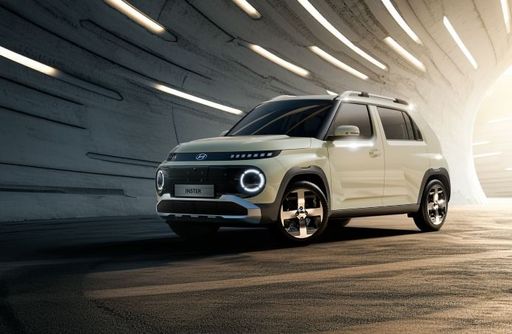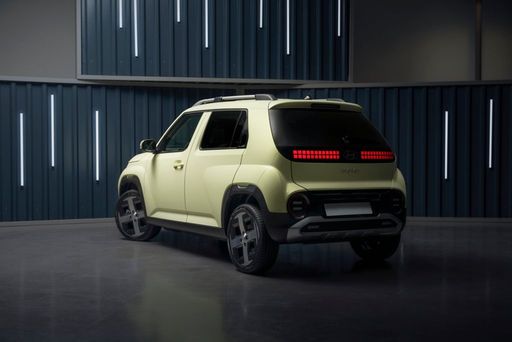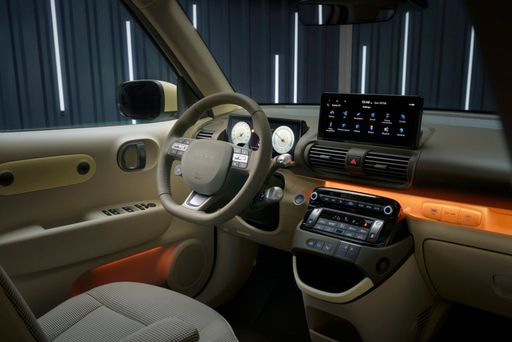Peugeot Boxer VS Hyundai Inster – Specs, Efficiency & Price Comparison
Which model is the better choice – the Peugeot Boxer or the Hyundai Inster? We compare performance (279 HP vs 115 HP), boot capacity ( vs 280 L), efficiency (26.20 kWh7.50 L vs 14.30 kWh), and of course, the price (33500 £ vs 20500 £).
Find out now which car fits your needs better!
The Peugeot Boxer (Cargo Van) is powered by a Diesel or Electric engine and comes with a Manuel or Automatic transmission. In comparison, the Hyundai Inster (SUV) features a Electric engine and a Automatic gearbox.
When it comes to boot capacity, the Peugeot Boxer offers , while the Hyundai Inster provides 280 L – depending on what matters most to you. If you’re looking for more power, you’ll need to decide whether the 279 HP of the Peugeot Boxer or the 115 HP of the Hyundai Inster suits your needs better.
There are also differences in efficiency: 26.20 kWh7.50 L vs 14.30 kWh. In terms of price, the Peugeot Boxer starts at 33500 £, while the Hyundai Inster is available from 20500 £.
Compare all the key specs now and find out which model fits your lifestyle best!
Peugeot Boxer
The Peugeot Boxer stands out in the commercial vehicle market with its robust design and spacious interior, making it an ideal choice for businesses in need of a reliable transport solution. Its efficiency and versatility are complemented by a range of advanced features aimed at enhancing driver comfort and safety. Whether navigating urban streets or long-distance routes, the Peugeot Boxer delivers a smooth and dependable driving experience.
detailsHyundai Inster
The Inster has quickly captured the attention of automotive enthusiasts with its striking design and dynamic performance. This model seamlessly blends advanced technology with comfort, making it an ideal choice for both daily commutes and adventurous road trips. With its spacious interior and innovative features, the Inster promises an exhilarating driving experience that doesn’t compromise on practicality.
details @ hyundai.news
@ hyundai.news
 @ hyundai.news
@ hyundai.news
 @ hyundai.news
@ hyundai.news

|
|
|
|
|
Costs and Consumption |
|
|---|---|
|
Price
33500 - 57800 £
|
Price
20500 - 25800 £
|
|
Consumption L/100km
7.5 - 9 L
|
Consumption L/100km
-
|
|
Consumption kWh/100km
26.20 kWh
|
Consumption kWh/100km
14.3 - 15.1 kWh
|
|
Electric Range
424 km
|
Electric Range
327 - 370 km
|
|
Battery Capacity
97.80 kWh
|
Battery Capacity
42 - 49 kWh
|
|
co2
0 - 233 g/km
|
co2
0 g/km
|
|
Fuel tank capacity
90 L
|
Fuel tank capacity
-
|
Dimensions and Body |
|
|---|---|
|
Body Type
Cargo Van
|
Body Type
SUV
|
|
Seats
3
|
Seats
4
|
|
Doors
4
|
Doors
5
|
|
Curb weight
2075 - 2940 kg
|
Curb weight
1380 - 1433 kg
|
|
Trunk capacity
-
|
Trunk capacity
238 - 280 L
|
|
Length
5413 - 6363 mm
|
Length
3825 - 3845 mm
|
|
Width
2050 mm
|
Width
1610 mm
|
|
Height
2254 - 2850 mm
|
Height
1575 - 1610 mm
|
|
Payload
560 - 2080 kg
|
Payload
317 - 357 kg
|
Engine and Performance |
|
|---|---|
|
Engine Type
Diesel, Electric
|
Engine Type
Electric
|
|
Transmission
Manuel, Automatic
|
Transmission
Automatic
|
|
Transmission Detail
Schaltgetriebe, Automatikgetriebe
|
Transmission Detail
-
|
|
Drive Type
Front-Wheel Drive
|
Drive Type
Front-Wheel Drive
|
|
Power HP
120 - 279 HP
|
Power HP
97 - 115 HP
|
|
Acceleration 0-100km/h
-
|
Acceleration 0-100km/h
10.6 - 11.7 s
|
|
Max Speed
90 - 170 km/h
|
Max Speed
140 - 150 km/h
|
|
Torque
320 - 450 Nm
|
Torque
147 Nm
|
|
Number of Cylinders
4
|
Number of Cylinders
-
|
|
Power kW
88 - 205 kW
|
Power kW
71 - 85 kW
|
|
Engine capacity
2184 cm3
|
Engine capacity
-
|
General |
|
|---|---|
|
Model Year
2024
|
Model Year
2025
|
|
CO2 Efficiency Class
G, A
|
CO2 Efficiency Class
A
|
|
Brand
Peugeot
|
Brand
Hyundai
|
Peugeot Boxer
A Versatile Workhorse: The Peugeot Boxer
The Peugeot Boxer is a name synonymous with practicality and reliability in the world of commercial vehicles. Designed to meet the diverse needs of businesses, the Boxer offers a range of models and configurations to cater to various requirements. From traditional diesel engines to innovative electric options, the Boxer is packed with features and innovations that make it a standout choice in the transporter segment.
Engine Options and Performance
The Peugeot Boxer provides a variety of engine options, ensuring there is a model to meet every business need. The diesel range features the 2.2 BlueHDi engines that deliver between 120 to 165 PS, offering a satisfying balance of power and efficiency. With a fuel consumption ranging from 7.9 to 8.9 litres per 100 km, these models are designed to keep running costs manageable while delivering robust performance.
For those seeking a greener alternative, the Peugeot e-Boxer offers an all-electric powertrain with options of 37 kWh and 70 kWh battery packs. These provide driving ranges of up to 116 km and 247 km respectively, making them ideal for urban deliveries. The electric models are powered by a motor producing 136 PS, ensuring that you have both power and sustainability in one package.
Innovative Features
The Peugeot Boxer is not just about robust engines and efficiency; it also introduces several innovative features for safety and convenience. The model comes with advanced driver-assistance systems, including lane departure warning, rear parking sensors, and cruise control, enhancing the driving experience and ensuring safety on the road.
The flexibility of design allows the Boxer to accommodate loads of varying sizes with a maximum loading capacity of up to 1835 kg. The interior is designed with practicality in mind, featuring well-placed storage compartments and a comfortable cabin that makes long hours on the road less taxing.
Interior and Comfort
The Boxer’s cabin is built with the driver’s comfort in mind, providing a supportive seating arrangement for up to three passengers. The integration of modern technology ensures that the Boxer is not just a transporter but also a mobile office. With Bluetooth connectivity, a touchscreen interface, and optional integrated navigation, staying connected and on course is made easy.
Dimensions and Capacity
Offering a variety of lengths from 4963 mm to 6363 mm and heights from 2254 mm to 2760 mm, the Peugeot Boxer ensures that businesses have the flexibility to choose the most suitable model. Despite its large capacity, with a loading volume that can accommodate substantial cargo, the Boxer is equipped with front parking sensors and a tight turning radius to aid in navigating urban environments and tight spots.
Electric Model Advancements
The e-Boxer signifies Peugeot's attention to environmental impact and the evolving needs of the market. With zero emissions and a potential load space that doesn't compromise compared to the diesel versions, the e-Boxer is an excellent choice for businesses looking to reduce their carbon footprint while maintaining operational efficiency.
Conclusion
The Peugeot Boxer stands as a versatile and capable contender in the commercial vehicle market. Whether for transporting cargo across long distances or handling city deliveries, its wide range of engine options and innovative features ensure that it can handle any task. As businesses increasingly look for efficient and environmentally-conscious modes of transportation, the Boxer, with its blend of traditional diesel and modern electric models, provides a comprehensive solution.
Hyundai Inster
The automotive landscape continues to evolve, and at the forefront of this transformation is the Hyundai Inster, a dynamic model set to impress electric vehicle enthusiasts. As a compact SUV, the Inster embodies a blend of innovative technology, user-friendly features, and an eco-conscious design, making it a contender in the burgeoning electric vehicle market.
Powertrain and Performance
The Hyundai Inster is powered by an efficient electric drivetrain, offering two main battery options: a 42 kWh and a 49 kWh version. These options translate to power outputs of 97 HP and 115 HP, respectively, allowing drivers to choose based on their performance needs. The Inster accelerates from 0 to 100 km/h in 11.7 seconds for the 42 kWh variant, while the more powerful 49 kWh model reaches the same speed in an impressive 10.6 seconds, showcasing Hyundai's commitment to delivering engaging performance.
Range and Efficiency
One of the standout features of the Inster is its electric range. The 42 kWh model provides a range of 327 km, while the 49 kWh variants extend the range to 360 km and 370 km. This remarkable efficiency is complemented by consumption figures of 14.3 kWh/100 km for the 42 kWh variant and 14.9 kWh/100 km for the 49 kWh options. These figures ensure that the Inster is not only suited for city driving but also capable of handling longer journeys with ease.
Dynamic Design and Comfortable Interior
Aesthetically, the Hyundai Inster boasts a sleek and modern look, featuring a compact SUV profile that is both sporty and practical. The dimensions, measuring between 3825 mm and 3845 mm in length, with a width of 1610 mm and heights ranging from 1575 mm to 1610 mm, contribute to its spacious and comfortable cabin. The interior accommodates up to four passengers, making it an ideal choice for small families or couples.
Innovative Features
The Inster incorporates advanced technology geared towards enhancing the driving experience. Its automatic transmission, utilizing a reduction gearbox, ensures seamless gear shifts. Additionally, drivers will appreciate the array of smart features designed for convenience and connectivity, including advanced infotainment systems and driver assistance technologies.
Sustainability Credentials
Hyundai is dedicated to sustainability, and the Inster is a testament to this philosophy. With a carbon footprint of zero emissions, the Inster falls into the A CO2 efficiency class, making it a responsible choice for eco-conscious consumers. The absence of traditional emissions positions the Inster not only as an economical option but also as a proactive step towards reducing our environmental impact.
Conclusion
The Hyundai Inster stands out as a versatile and innovative solution in the electric vehicle segment. With a balanced approach to performance, efficiency, and sustainability, it caters to the modern driver’s needs and reflects the automotive industry's shift towards electrification. The future looks bright for the Inster, as Hyundai continues to pave the way for greener driving experiences.
The prices and data displayed are estimates based on German list prices and may vary by country. This information is not legally binding.
